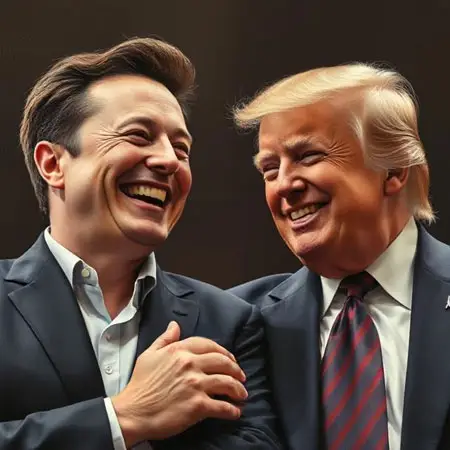(PCC)Truth or Tin-Foil Hat? You decide. In the volatile intersection of politics and corporate governance, few figures ignite more controversy than Elon Musk and Donald Trump. Their dramatic public split, amid a high-stakes political season, sent shockwaves through markets, causing Tesla’s valuation to shed over $380 billion in a single day. But was the feud genuine? Or, as some suggest, was it a calculated maneuver designed to neutralize activist shareholders and redirect political momentum?
Follow-up article: https://patriotcommandcenter.org/forum/lol-elon-musk-and-president-trump-are-playing-the-media
The democratic shareholder revolt exacerbated their financial problems. For months, pressure had been mounting within Tesla’s shareholder base, especially among institutional investors aligned with progressive causes. Concerns were growing over Musk’s increasingly public political affiliations with former President Donald Trump. Some viewed Musk’s alignment as potentially damaging to Tesla’s brand, customer loyalty, and access to ESG-friendly (environmental, social, and governance) capital.
According to insiders, there was growing legal chatter about a potential derivative action, a lawsuit that shareholders can file on behalf of a corporation against a board member or executive. The theory: Musk’s actions and political entanglements were damaging Tesla, and the board had failed to rein him in. If successful, such a suit could have resulted in Musk losing substantial control or influence at Tesla.
Could it be perceived as a conflict or a breakthrough? Most of the public is unaware of the legal shenanigans the billionaires can play in the media, on Wall Street, and in our minds.
Then came the Musk-Trump fallout: a cascade of public statements, social media swipes, and high-profile disagreements over immigration, taxation, and foreign policy. It culminated in Musk dramatically denouncing Trump during a viral interview, calling the former president “unfit for a unified America.”
The result? Activist shareholders celebrated Musk’s apparent ideological pivot. The pressure for a derivative lawsuit cooled. But Tesla’s stock price cratered, erasing hundreds of billions in market cap and crushing investor returns.
Was it an accidental fallout from a political shift or a tactical play? Was there a stock price trap? Some observers posit a darker interpretation: that Musk and Trump staged the fight to “put activist shareholders in their place.” By tanking the stock price, Musk may have demonstrated the cost of undermining his authority. If accurate, the message was unmistakable: confronting Musk’s leadership through political pressure or legal action carries a significant cost.
It’s speculative, but not implausible. After all, Tesla’s governance history includes past shareholder lawsuits, including the high-profile SolarCity case, in which Musk was accused of using corporate resources to bail out a struggling personal investment.
The gambit of the Epstein file could have been a skillfully executed strategy. Musk unleashed another explosive move as the political tensions subsided, hinting that the eagerly anticipated Epstein client logs might include Trump’s name. Ironically, such speculation led some Democrats, who had been cautious about the Epstein files, to suddenly push for their public release so as to intimidate President Trump.
Days later, the Republicans fully unsealed the files and began the process of making them public. Early rumors suggest several prominent Democratic donors and political figures are under scrutiny, creating new political headaches for the party, and of course the Republicans will use whatever leverage they can extract from those dastardly files to protect democracy, of course.
From derivatives to deals, the Republicans are pursuing a single goal of achieving ultimate leverage.
In a final twist, GOP sources close to Trump now claim the party is gaining Democratic support for a major legislative initiative, internally dubbed the “Kill the Bill.” If accurate, it would mark an extraordinary political reversal, born not through negotiation, but through scandal, strategy, and scorched-earth media manipulation.
Was it all theater? Think about it, what if…? There is no conclusive evidence. No official documents confirm the filing of a derivative action, and no communications demonstrate any coordination between Trump and Musk. But in the world of billionaires and Beltway power plays, surface-level drama often masks deeper games.
If the Musk-Trump rupture was a performance, it may go down as one of the most sophisticated (and cynical) political-business maneuvers in recent memory: neutralizing hostile shareholders, shaping public opinion, collapsing opposition strategy, and regaining control of the narrative.
What was the price? For now, only Tesla’s battered shareholders know the price. The Democrats have demanded the Epstein files be opened to the fullest extent, and now some ‘on the fence Democrats’ are pressured to sign the Big Beautiful Bill, and in doing so, the Epstein files may conveniently fade into history until the poisonous files are needed for future leverage against the Democrat Party.
Final Word: Is this fiction or fact? Either way, it would make a fantastic movie!



